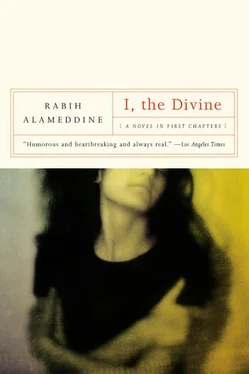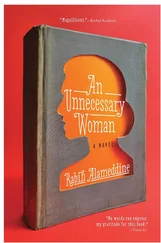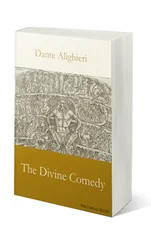My mother was swimming that day. She was trying to climb on one of the rocks to rest when a sea urchin’s spine inadvertently pricked her ankle. She screamed, but apparently had enough composure to swim back to the cement platform. People called to the man with the stethoscope to come look at the ankle. The stories differ here. My grandmother says the bleeding was so profuse, it took a heroic effort on my father’s part to halt it. My father says there was no blood at all, and the prick was barely noticeable. My father examined the ankle and told my mother the only way to save her foot was for him to suck the poison out of the most beautiful ankle in the world. He then lifted her ankle and kissed it.
Their love affair was torrid and scandalous. They embarrassed the university by kissing publicly. The Druze community felt it was losing one of its brightest men and my grandparents were horrified. They objected to everything about Janet. They did everything they could to break up the couple, threatening and cajoling, to no avail. From the beginning, Janet tried to appease her future in-laws. She dressed more conservatively, held her tongue, and made Mustapha the most important thing in her life. When she appeared at Mustapha’s uncle’s funeral, following the precise rituals of the Druze, wearing the traditional black, everyone understood it was a lost cause. Mustapha and Janet were to marry.
Janet became more Druze than any Druze woman, even though she could not actually become one. One could not convert to the religion, but had to be born into it. Since there were no civil marriages in Lebanon, Mustapha and Janet had to travel to Limassol, Cyprus — technically, that meant that all their children were bastards. They came back to an apartment in Beirut bought for them by my grandparents. While Mustapha completed his studies, Janet became a Druze housewife. She learned to cook; her dishes became the talk of the town. To this day, it is said that her kibbeh, a dish of raw meat and cracked wheat, is unequaled in all of Lebanon. She became an impeccable hostess, generous to a fault, her house the cleanest it could possibly be. She never missed a funeral or a wedding, was the first on congratulatory visits when a birth was announced and the first at hospitals when an acquaintance was ill. She began to speak Arabic, with a mountain Druze accent even, which made her Druze contemporaries giggle but pleased the elders. She tried hard to be perfect and most likely would have succeeded had it not been for the daughters.
Amal was first, exactly nine months to the day from their wedding night. Everybody would have preferred a boy, but they were happy with Amal. She was healthy, a pretty baby, and there was time for boys later. Even her name meant hope in Arabic. They were disappointed with Lamia, but the marriage survived. When I arrived on the scene, it was too much. My grandparents convinced my father he needed a Druze wife who would provide him with a bushel of boys. Mustapha sent Janet back to New York.
Before she was married, Janet had been a lively girl, gregarious even. She had always been strong. After the marriage she became quiet in deference to her new position in the community. She became a steady and reliable woman who never said much, a woman who stood bravely and lovingly by her husband for six years as he finished medical school. She withstood most things thrown at her, but she finally succumbed to her husband’s fizzled love.
After the divorce, she was never strong again. The first time I saw her after she left, I was eighteen. She did not resemble the woman described in any of the stories I had heard about her. When I moved to New York with my first husband, Omar, we grew closer, but it was a constant strain to be in her presence for she never forgave. She had been wronged, and lived that wrong for the rest of her life.
I did not forgive my father his treatment of my mother until I repeated the same story, taking on the roles of Mustapha and Janet simultaneously. Like Mustapha, I fell out of love with my husband, and like Janet, I am no longer with my child. I made mistakes.
Like Janet and Mustapha, Omar and I met at the American University beach in 1980, while we were both engineering students. I saw him with a group of friends, diving from a rock into the sea. I had noticed him before. He was two years ahead of me and would be graduating in a couple of months. He dove, holding a knife in his hand, coming back up a few seconds later with a sea urchin. He got out of the water, cut the sea urchin in half, and fed it to a dog. It was not the same story I grew up with, but close enough. He noticed me watching him and sauntered over. We chatted about school and the engineering program. I remember his smile, sly, demure. He was somewhat shy, yet playful. Everything about him intrigued me, how his bushy eyebrows almost met, how they lined up from side to side since his face was so narrow. I loved his nasal voice, how he took a quick, short breath before every sentence, the seconds it took him to think before every response. Like my mother, I was smitten on that beach.
We went out twice before we made love. I assume I shocked him. We had gone back to his house, his parents were out. We kissed and I did not stop him. Step by step, he thought he was seducing me, while I was fully ready. The lovemaking was a little dull, but I did not have much to compare it to. Although I was not a virgin, I was not experienced. I was frightened at times, mostly in the beginning, simply the fear of being touched by a man again, but I was determined, or, more accurately, committed. I went through with it and he fell in love. In the time we were together, our lovemaking never improved. Omar loved it, whereas I found it merely amusing. I never achieved an orgasm with him.
We became an item. I knew better than to tell my parents, my father and his wife. Omar was Greek Orthodox, more acceptable than Maronite, but still Christian. Though interfaith marriages were fairly common, they simply were not acceptable in my family. My father did not want me to repeat his mistakes. I guess I would have hidden the relationship anyway, even if Omar were Druze. I don’t think my father could handle the fact that I was not a virgin. I confided in my eldest sister, Amal, who was married already. She thought Omar was a good match for me. He was intelligent, from a well-respected family, and was extremely rich. His parents, on the other hand, did not think I was a good match for their son. Yes, I was pretty. Yes, I came from a good family. They thought, however, I was after their money.
His parents did not do much to oppose our courtship. They thought since Omar was going to New York in the summer to get his graduate degree from Columbia, he would forget about me. Little did they know. I packed two suitcases and left with him. We eloped, were married within a month. I found out I was pregnant.
I loved Omar. There was never any doubt in my mind. Maybe not as much as he loved me, but I loved him. He treated me like a queen. The first year I was a housewife and took care of him as best I could. I was never a good housekeeper or cook, so he hired someone to do the menial jobs. While pregnant, I applied to Barnard and was accepted for the following year.
I delivered a beautiful baby boy, Kamal, on May 19, 1981. The pregnancy was surprisingly easy, but the delivery was nothing short of hell. I was in labor for twenty-seven hours. How anyone could accuse me of not loving my boy is beyond me.
I may not have been a good housekeeper, but I was a great mother. We lived on the Upper West Side, Eighty-third and Amsterdam. Most days during that summer before I enrolled at Barnard, when Omar went to the university, I would prepare Kamal and take him for a stroll all the way to Columbia’s library. I walked as exercise to lose all the weight I had gained during the pregnancy. I studied. Even though I was sure I would make it at Barnard, missing a year might have been a problem if I did not spend the time in the library. On the days I did not go to the library, I walked across the park, taking Kamal to Janet. Those days were hard. Even Kamal could not lift Janet’s moods. I believe I reminded my mother of her failures.
Читать дальше












